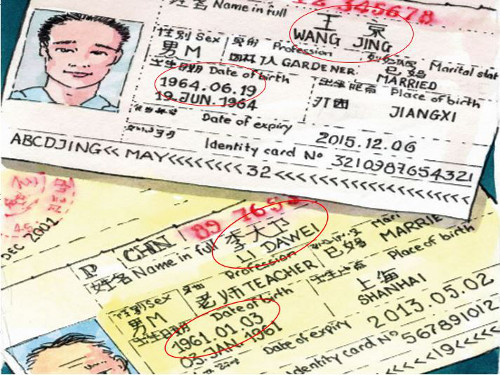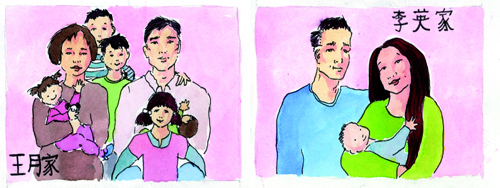3 Comparisons with bǐ 比
The most common way of making comparisons in Chinese is to use the word bǐ 比 (compared with). To form a comparative structure, insert bǐ 比 between the two things or people that are being compared and add a relevant adjective at the end of the sentence.
‘Wang Jing is taller than Li Yue.’
| A | bǐ | B | Adj. |
|---|---|---|---|
| Wáng Jīng | bǐ | Lĭ Yuè | gāo. |
| 王京 | 比 | 李月 | 高。 |
| lit. Wang Jing | compared | Li Yue | tall |
‘My elder sister’s Chinese is better than mine.’
| Wǒ jiějie de Zhōngwén | bǐ | wǒde | hăo. |
| 我姐姐的中文 | 比 | 我 | 好。 |
| lit. my elder sister’s Chinese | compared | mine | good |
‘My mum is older than my dad.’
| Wǒ māma | bǐ | wǒ bàba | dà |
| 我妈妈 | 比 | 我爸爸 | 大。 |
| lit. my mum | compared | my dad | big |
Note when the adjective dà 大, normally used to describe the size of objects, is used to describe people’s age rather than body size. lǎo 老 (old) is used when comparing elderly people’s ages:
Wǒ nǎinai bǐ wǒ yé ye lǎo. 我奶奶比我爷爷老。
(My grandma is older than my grandad.)
Activity 3
Part 1
Wǒ māma bǐ wǒ bàba dà 我妈妈比我爸爸大。
My mum is older than my dad.
As shown in the example above, it appears that normally the verb shì 是 is not required when forming a comparison sentence. Why is it? (Hint: could you explain it by your knowledge from last week?)
Answer
Perhaps, you can treat comparison sentences as ‘topic + comment’ sentences. For example, in sentence Wǒ māma bǐ wǒ bàba dà. 我妈妈比我爸爸大, the ‘topic’ is wǒ māma bǐ wǒ bàba 我妈妈比我爸爸 (My mum compared with my dad), the ‘comment’ is dà 大 (older). In a ‘topic + comment’ sentence, the verb shì 是 (to be) is not present.
Part 2
Review the figures below and then come up with Chinese comparative sentences to describe what is shown. Write them down in your language notebook then check the answers afterwards.
Remember that it is not necessary to use the verb shì 是 (to be) when making comparisons.
Answer
Lǐ Dàwèi bǐ Wáng Jīng dà. 李大卫比王京大。
Li Dawei is older than Wangjing.
Answer
Wáng Yuè jiā de rén bǐ Lǐ Yīng jiā de rén duō. 王月家的人比李英家的人多。
There are more people in the Wang Yue family than in the Li Ying family.


